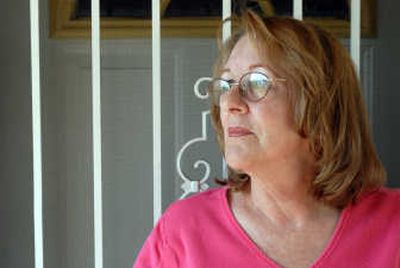Finding solace with support

A nightmare ended the day Micki Hall’s daughter landed in jail.
No more frantic drives, searching and hoping her child was safe. No more wondering if her daughter’s friends, all criminals, were exposing her to AIDS or hepatitis. No more anticipation of the dreaded phone call that her child was dead.
Although it seemed strange to feel grateful for incarceration, Hall knew it was the lesser of evils. The greater evil was the methamphetamine addiction that had invaded her daughter’s life.
Hall, of Spirit Lake, found solace in her lowest moments. First, her daughter went to jail; then, her father died.
Soon after, Hall discovered a support group begun by another stressed mother, Judy Reid of Post Falls.
Last year, Reid started a local branch of the national organization Mothers Against Methamphetamines, or MAMa, to cope with her son’s addiction.
But to keep efforts and donations focused locally, Reid abandoned the MAMa name and created the Inland Empire Meth Alliance. Members have come from as far as Orofino and Priest Lake, Idaho, and Newport, Wash., to attend the bimonthly meetings in Post Falls.
Besides easing guilt and sharing burdens, the group works to help families and friends get their addicted loved ones into recovery.
“If it weren’t for the group, I don’t know where my head would be,” Hall said.
Even though her daughter was safely behind bars, Hall still faced uncertainties.
From rehabilitation, her daughter asked for help in buying stamps. Savvy group members advised Hall to refuse to do that and to send self-addressed, stamped envelopes instead so her daughter would write her and not her drug-involved friends.
Hall said she never would have thought of that herself.
In addition to supporting one another, group members share a goal of educating the community about the horrors of meth.
Through her outreach efforts, Hall learned she’s not alone.
“There are so many people who have a relative on this drug,” she said. “We tell them to come to the meetings and we can help. If they’d take that first step, they’d never stop coming.”
Families of addicts open up to Hall, and she responds with what she needed to hear: “It’s not your fault.”
Hall’s daughter received four months of jail time and 11 months of rehab after her sentencing for misdemeanor offenses.
Now, Hall encourages other families to do as she did: Ask the courts for as much time in rehab as possible.
Hall says the support group also helps families learn to recognize their “enabling” behavior.
“I was totally enabling,” she said. “I didn’t understand what meth is. I thought I could help her.”
Hall now recognizes that simple things that a mother might do for a 19-year-old child really were actions that prolonged and enabled her daughter’s 2 1/2-year addiction.
Hall provided a place to stay and money. Even buying diapers for a grandchild can “enable” if the parent is an addict, Hall said. The addict likely will return an unopened package of diapers to the store and use the cash for drugs.
Inland Empire Meth Alliance founder Reid wants the world to know that meth addicts are not just losers, robbers and thieves. They also are somebody’s children, like her own son.
He was a handsome 200-pound young man before meth brought on two strokes and a heart attack and diminished him to 140 pounds.
He is in recovery today – but not before teaching his mother some lessons in “tough love.”
When her son hit what Reid calls the “final stages” – when the addict either will get treatment or die – she didn’t see him for four months. She made the painful decision to stay away until he agreed to treatment.
She heard his voice on her answering machine, begging and crying for money. Each day, her thoughts were preoccupied with whether he was alive or dead.
Reid said she started the group to support others when she needed support herself.
“You can’t go through it alone,” she said. “You have to put yourself back together for the day they become clean.”
Her group, now with about 18 members, is nonprofit, nondenominational and faith-based.
Reid offers encouragement to families and shares wisdom about how to keep addicted children from stealing from them or destroying their homes.
The group has found unexpected success. Although outlooks often are reported as grim for meth addicts, many group members report that their children have cleaned up their acts.
Reid’s son is another success story.
He has been clean for 15 months. He has made amends and good choices despite lingering physical effects from his addiction, Reid said.
Yet, with meth as her son’s drug of choice, she cannot completely relax about the possibility of relapse. She spreads the word about meth’s high addiction rate and low recovery rate whenever she can.
“If anyone says, ‘Put up a booth or put out a flier,’ I’ll be there,” she said.
It has been more than a year since Hall joined Reid’s group. Her daughter has remained “clean” throughout that time. She found employment with the Salvation Army rehab facility that treated her, and her mother found a new goal.
Hall gauges how her daughter is progressing compared with other addicts, but her focus at support group meetings is on the other members.
She tells them that recovery is possible. She urges parents to keep fighting for their children and to never give up.
“I want to help others,” Hall said. “You feel like you’re in hell and like there’s no way out. But there is hope and there is help.”